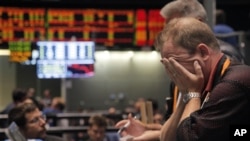U.S financial markets moved sharply lower Monday, following similar declines throughout the world.
It’s been a brutal day on U.S. financial markets.
Financial analyst Muriel Siebert says investors have been focused to television sets, watching market reports. “They want to see how their net worth is doing. This affects peoples’ retirement accounts, it affects if they had any borrowed money, other accounts," she said.
Millions of investors are seeing their holdings decline. Wall Street opened down on Monday with all major market indexes - the Dow Jones Industrial Average, S & P 500 and NASDAQ - showing losses of up to five percent by midday.
Many market analysts say the weakness on Wall Street reflects news of America’s lowered credit rating. But David Resler, chief economist with Nomura Securities, downplays that assessment. He says investors were aware of U.S. fiscal challenges long before ratings agency Standard and Poors downgraded the U.S. government credit rating. Instead, he attributes the decline to growing investor anxiety over European financial difficulties, particularly those of Greece.
“There’s a worry that contagion from the debt problems facing Greece and to a lesser extent some of the other countries of Europe, will spill over into the larger European economies via the banking system and that the effect on the European system will spill over into the U.S," he said.
As stocks declined Monday, gold rose, selling at more than $1,700 for the first time ever. Resler explains. “Investors around the world have little confidence in governments of any country in the world right now and are looking for the safest possible asset," he said.
David Resler says the message for investors is volatility. “And it’s the word of the day because we don’t have good clarity about significant challenges that are faced in the financial system generally, but in the European financial system in particular," he said.
Siebert says partisan bickering in the United States contributed to stock market uncertainty. “We have had more partisan hatred in this country than I have ever seen in my lifetime, and I think that has upset people," he said.
Markets around the world also have fallen sharply Monday, with key indexes in Asia and Europe off 2 percent or more.
Analysts Give Differing Assessments of Market Plunge












